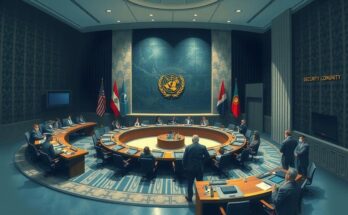International donors pledged nearly €6 billion to support Syria in rebuilding efforts after President Bashar Assad’s ousting. The conference saw the Syrian authorities represented for the first time. While the EU promised significant financial aid, concerns about recent violence and governance under new Islamist-led authorities persist. The ongoing humanitarian crisis requires continued international support.
International donors convened in Brussels on Monday, pledging approximately €6 billion ($6.5 billion) to assist in rebuilding Syria following the ousting of President Bashar Assad. The ongoing civil war, which has persisted for 14 years, has resulted in millions of refugees leaving Syria, prompting Western and regional nations to seek stability in the country.
For the first time at this annual conference, the Syrian authorities were represented by interim foreign minister Assaad al-Shibani, representing a significant shift. However, recent violent outbreaks have raised concerns regarding the new Islamist-led authorities and their governance capabilities.
European Commission President Ursula von der Leyen announced an increased commitment from Brussels, pledging almost €2.5 billion for assistance this year and the next. Of the total support, €4.2 billion will be offered as grants, while €1.6 billion will be in low-interest loans, stressing the necessity for sustained support for Syrians abroad and those returning.
It is worth noting that the United States has not made any new pledges during this conference, despite having provided substantial assistance over the past 14 years. Natasha Franceschi, the US deputy assistant secretary, indicated that while the US would continue to deliver assistance aligned with its policies, it anticipated other nations would contribute more significantly to fill the financial void left by the US budget cuts.
Meanwhile, Syria’s new leadership, represented by former Islamist rebel commander Ahmed al-Sharaa, has actively sought financial aid to aid recovery efforts. The European Union has relaxed sanctions on specific economic sectors and is closely monitoring the authorities’ commitment to an inclusive governance transition. Shibani expressed gratitude for these measures but urged for further support to achieve the nation’s recovery.
Positive developments have been noted, including a constitutional declaration announcing a five-year transition period and the promotion of women’s rights and freedom of expression. However, hopes for stability were overshadowed by recent violence resulting in the deaths of nearly 1,500 civilians, primarily from the Alawite minority. Shibani asserted the commitment to justice for those responsible for violence, emphasizing the inclusive vision for citizenship within Syria.
Despite the EU’s efforts to assist, the humanitarian crisis persists, with a staggering 16.7 million people requiring aid as reported by the United Nations.
The EU has held this annual donor conference for eight years, primarily focusing on refugee support rather than engagement with the Assad regime. With the need for humanitarian relief in Syria immense, sustained international cooperation and financial assistance remain paramount in addressing the ongoing crisis.
In conclusion, the international community has reaffirmed its commitment to assist Syria through a substantial aid pledge of €5.8 billion. However, concerns remain regarding recent outbreaks of violence and the commitment of Syria’s new leadership to an inclusive governance transition. The humanitarian crisis is severe, necessitating collaboration among nations to address the needs of millions still facing dire circumstances.
Original Source: www.rfi.fr




